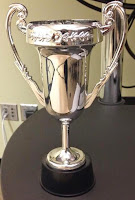This past weekend, Nov. 7-9, the Neuroscience Information Framework, the Su Lab, NDex, The International Society for Biocuration and the San Diego Center for Systems Biology hosted the second Network of Biothings Hackathon. The event took place at Atkinson Hall (Calit2) on the UC San Diego campus. For the record, and to enhance what can already be seen in the Twitter story of this event, here is what went down.
Friday evening about 30 people arrived at Atkinson hall where they:
- consumed Indian food and American beverages,
- met each other and talked over project ideas,
- each decided on a project to work on for the weekend
Saturday the group:
- ate bagels for breakfast, sandwiches and leftover Indian food for lunch, and pizza for dinner
- hacked furiously to develop 8 distinct team projects
Sunday morning, we came together for more bagels, some last minute hacking and rapid presentation formation. At 10:30am we got started with 8, 10 minute project presentations. Here is a very brief list of the projects with links out to all of the code that was developed. (More details are available on the ideas page.)
- BioPolymer: A set of embeddable web components to display and edit bio data. Initially data from MyGene & MyVariant. Team: Mark Fortner, Keiichiro Ono
- SameSame: a dynamic tool for finding and visualizing the degree of similarity between any set of biomedical concepts. Team: Benjamin Good, Maulik Kamdar, Alan Higgins, Alex Williams
- CIViC – Clinical Interpretation of Variants in Cancer: Crowdsourcing and web interface for curation of clinically actionable evidence in cancer. Team: Obi Griffith, Adam Coffman, Martin Jones, Karthik G, Jon Cristensen, Julianne Schneider
- Citizen Science: An app to enable people to extract structured ‘facts’ (subject predicate object triples) from unstructured text. Slides from project presentation. Team: Richard Good, Hannes Niedner, Andrew Su
-
Overview presentation slides: Google Slides
-
iOS annotator: https://bitbucket.org/sulab/citizenscience/
-
- SBiDer: Synthetic Biocircuit Developer: A web-app to search a database of operons [functional biochemical pathways] to use them in new and novel ways [to make synthetic organisms such as the ones used to make this Malaria treatment]. Team Justin Huang, Kwat Yeerna, Fernando Contreras, Joaquin Reyna, Jenhan Tao
- NDex: The NDEx project provides a public website where scientists and organizations can share, store, manipulate, and publish biological network knowledge. Team Dexter Pratt
- fiSSEA: A framework that integrates MyGene.info and MyVariant.info to retrieve functional prediction annotations (or any type of annotation) for knowledge discovery, specifically implement CADD scores for “functional impact SNP Set Enrichment Analysis”. Team: Adam Mark, Erick Scott, Chunlei Wu
- MyGene.Info Taxonomy Query: Added detailed taxonomy information to mygene.info. Allows queries based on taxonomy ID and advanced queries based on hierarchies of taxonomic nodes. Team: Greg Stupp, Chunlei Wu
- https://bitbucket.org/stuppie/metaproteomics/ (see Taxonomy Parser)
 |
| Hackathon Trophy |
And the winners were…
#1 Citizen Science
#2 SBiDer
!
There were a lot of very exciting things about this event. In addition to a strong core of academics from multiple universities, we also had local app and algorithm developers from industry. While the US west coast lean was powerful, we did have representatives from St. Louis and one that came all the way from Canada. We also had a very strong undergraduate team (taking second place!). All of the projects clearly made real progress over the weekend with some excellent cross-pollination of code and ideas.
And the coolest thing about this event??
My Dad was on the winning team :).. Go Dad!
Special thanks to Martin Jones for running around with me picking up bagels, pizza, drinks, and snacks for everyone and to Jeffrey Grethe for keeping everything running smoothly at the event, pushing around tables, helping clean up after the hackers, and calmly handling everything that needed to be done.

Trackbacks/Pingbacks